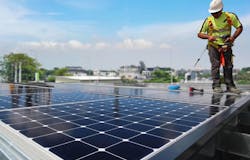TotalEnergies Begins Constructing 12 MW Solar and 7.5 MW Battery Storage Project at JFK International Airport in New York
TotalEnergies, a global energy company, has started constructing an onsite solar generating and storage system at John F. Kennedy (JFK) International Airport in New York along with the Port Authority of New York and New Jersey (PANYNJ) and the New York Power Authority (NYPA).
The solar and storage system will be erected as a canopy in one of JFK's long-term parking lots. The solar carport will generate around 12 MW of onsite power and will be paired with an additional 7.5 MW of battery storage to help reduce airport energy use during peak periods.
While about half of the 12 MW will power the AirTrain rail link connecting JFK to the greater New York City area, the remainder will be used by historically disadvantaged households in the communities surrounding the airport.
The project is expected to be operational in phases during 2025 and 2026. Once completed, the solar carport will produce enough clean energy to reduce CO2 emissions by more than 6,000 tons annually, equivalent to the greenhouse gas emissions of nearly 1,500 gasoline-powered passenger vehicles driven for one year.
The solar and storage project will also contribute to the Port Authority's goal of reaching net zero greenhouse gas emissions across its facilities by 2050.
TotalEnergies has a portfolio of large-scale solar, battery storage, onsite B2B solar distributed generation, and onshore and offshore wind projects expected to generate up to 10 GW of renewable power by 2025 and more than 25 GW by 2030.
TotalEnergies is building a portfolio combining renewables (solar, onshore, and offshore wind) and flexible assets (CCGT, storage) to deliver clean firm power to its customers as part of its ambitions to get to net zero by 2050. The company targets to reach 35 GW in 2025 and more than 100 TWh of net electricity production by 2030.
About the Author
EnergyTech Staff
Rod Walton is head of content for EnergyTech.com. He has spent 17 years covering the energy industry as a newspaper and trade journalist.
Walton formerly was energy writer and business editor at the Tulsa World. Later, he spent six years covering the electricity power sector for Pennwell and Clarion Events. He joined Endeavor and EnergyTech in November 2021.
He can be reached at [email protected].
EnergyTech is focused on the mission critical and large-scale energy users and their sustainability and resiliency goals. These include the commercial and industrial sectors, as well as the military, universities, data centers and microgrids.
Many large-scale energy users such as Fortune 500 companies, and mission-critical users such as military bases, universities, healthcare facilities, public safety and data centers, shifting their energy priorities to reach net-zero carbon goals within the coming decades. These include plans for renewable energy power purchase agreements, but also on-site resiliency projects such as microgrids, combined heat and power, rooftop solar, energy storage, digitalization and building efficiency upgrades.
